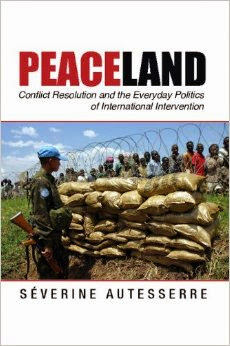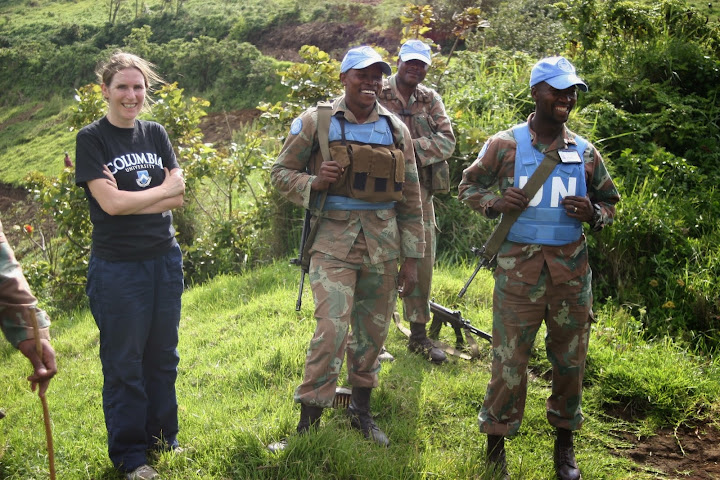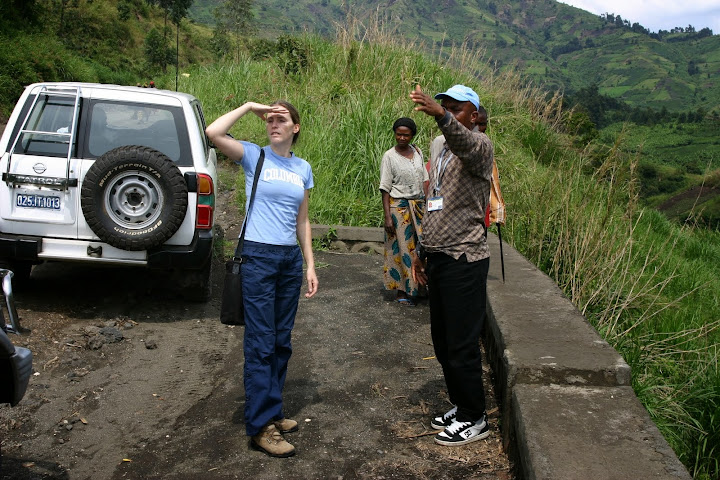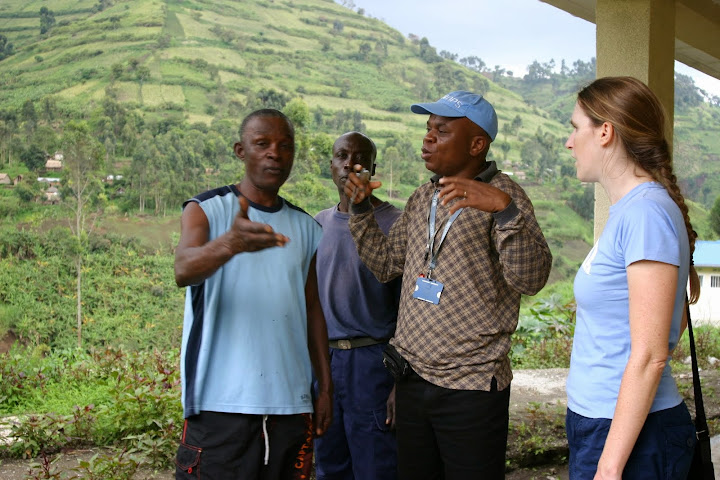I am very privileged to have the opportunity to read Dr. Séverine Autesserre’s book Peaceland: Conflict Resolution and the Everyday Politics of International Intervention. Being a college student studying international relations, I feel confident in advocating that this book is nothing like your normal assigned textbook or research paper (which most of the time students end up reading through the night before class). On the contrary, this is a book that you can sit down on the couch and enjoy reading while sipping your afternoon coffee.

Dr. Autesserre provides first-hand experience with international peace builders as well as the domestic victims through her ethnographic fieldwork and research trajectory. This book is a living theory of international relations combined with a dynamic documentary of transnational intervention; this book criticizes the conventional understanding of intervention while incorporating importance of distinctive cultures of victims and peace builders.
The information Dr. Autesserre provides, based on her experience working in various conflict zones, offers readers a tangible understanding of the issues of intervention: the mentality of peace builders operating on the ground, reasons for the current perpetuating conflict, and the various perceptions of peacebuilding from different perspectives. As a student, I learned various lessons after reading this book, especially how a peace builder’s behavior and mentality play a crucial role in shaping the outcome of conflict resolution - and brought me to ponder what is the most effective way to achieve conflict resolution.
This book will give you a rich understanding of effectiveness of intervention, whether you’ve worked in conflict zones or not. As long as you are passionate and curious about international relations, you should sit down and sink into this book. Highly recommended!

I was lucky enough to catch up with Dr. Autesserre, a professor at Barnard and Columbia, and ask her a few questions, including inspiration for the book, peacekeeping, intervention, and more. Here’s what she had to say…
What was the inspiration for this book?
It was a convergence of two things: my research trajectory and an experience I had in the field.
The moment in the field that marked me happened in Congo in the early 2000s. I was working for a humanitarian aid organization, and I was having lunch with my team – all expatriates who had devoted their lives and careers to helping people affected by violence. And my colleagues started talking about our Congolese team, and about Congolese partners and beneficiaries, in ways that were extremely insulting and, to me, profoundly shocking. They were ranting about how Congolese were lazy, stupid, violent, etc. And I thought: these are people who know better; these are great people, with strong moral values, who have made a lot of sacrifices to be here, and who would be shocked if they could see themselves saying such things. And yet, they are not even embarrassed to talk like that. So I wondered what had happened to transform genuinely good, open-minded people in the kind of prejudiced persons they would usually hate.
And then the more I thought about this experience, and the more I talked to friends and colleagues about it, the more I saw that there was something really wrong with the way international peacebuilding operates on the ground.
That’s where my research trajectory comes into play. The other main inspiration for Peaceland is a puzzling observation I made when conducting research for my first book, The Trouble with the Congo. Until that time, I, like most other scholars, assumed that a peacekeeping soldier from Pakistan, a diplomat from the United States, and a human rights advocate from Senegal would approach their jobs quite differently. Yet, while in the field, I observed striking similarities in the ways that international interveners understand the situations they face and in the strategies they adopt, despite their otherwise extremely different national, professional, and social backgrounds.
In The Trouble with the Congo, I traced these similarities to the existence of a dominant peacebuilding culture shared by most international actors deployed in a war or post-war situation. At the time, I focused only on elements that might affect international involvement at the local level. For Peaceland, I sought to inquire into the factors that shape other parts of the intervention strategy, beyond the approach to grassroots conflicts. So I conducted field research in Burundi, Congo again, Cyprus, Israel and the Palestinian Territories, South Sudan, and Timor-Leste, and I reflected on my previous experience as an intervener in Afghanistan, Kosovo, and Nicaragua. This new research confirmed my original insight – the presence of a shared way of seeing the world among international peacebuilders who otherwise have extremely different backgrounds. And it led me to develop a new argument around the importance of the interveners’ everyday life and work in accounting for these commonalities.

I think you've made great points analyzing the peacekeeping process from different perspectives and what you mentioned in your books would definitely be instrumental for Political Science students. One of the ideas that strikes me is that you believe one of the fundamental failures of peacekeeping is that the people, not only civilians, but even the peacekeepers, have different perceptions of peace; a lot of times, their perceptions are not always similar with that of the local people, and therefore international intervention doesn't always yield the best outcome, especially those with military enforcement. How would you evaluate the leverage of softpower intervention like using education, consistent negotiation, etc? Are there any alternative ways to build peace instead of international intervention?
Yes, of course, education, consistent negotiation, and the like, are all very important – and they are often much more conducive to lasting peace than military action. But it is important to clarify that my interpretation of “intervention” does not only focus on the use of military force by states. Like most researchers who work specifically on peacebuilding, I define interveners to include not only states, but also inter-governmental and non-state actors, and their actions to encompass not only use of military force, but also a range of other military and civilian undertakings aimed at ending existing violence and preventing its recurrence. So education and consistent negotiation are part of the initiatives that I study.
And the important point here is that there is a consensus among scholars and host populations that external actors and external expertise are often – not always, but often – necessary for effective peacebuilding. Foreign actors have a number of distinct advantages in conflict zones. For instance, they are less sensitive to pressure or blackmail from warring parties; they bring a different kind of expertise and experience; they also enjoy financial resources and international networks that local people often lack. So what we need is not to forfeit these contributions, but rather to think about how we can increase the effectiveness of international support to peacebuilding initiatives – including those like education and consistent negotiation.
To do so, we need to look at the everyday dimensions of international peacebuilding on the ground. By everyday dimensions, I mean mundane elements, such as the expatriates’ social habits, standard security procedures, and habitual approaches to collecting information on violence. In Peaceland, I demonstrate that mundane, everyday practices shape the overall intervention from the bottom up. So, to increase the effectiveness of international peace efforts, we need to reform these everyday routines.

When I think of international intervention, I think of military enforcement, political control and oil. I believe countries don't have friends, especially the US, we only have national interest; so when it comes to country like Rwanda during the genocide, none of the countries agreed to send troops there. (I assume that the US would send troops there immediately if there was oil in Rwanda.) During the genocide, the UN wasn't even able to borrow any troops from any countries. So how should we hold international organizations accountable when its member states are not obeying?
The main problem is that international and non-governmental organizations are accountable to their donors – countries, individuals, and organizations that finance international action. But they are not accountable to the people that they intend to help. That’s were the real issue lies: we need to add what people in the aid and peacebuilding fields call “downward accountability,” meaning we need to make international peacebuilders accountable to their intended beneficiaries. It’s one of the best ways to ensure that local input and local ideas will be taken into account during the design and planning of international programs, and one of the best ways to ensure that ineffective, inefficient, and counterproductive initiatives will be stopped before they waste too much money or do too much harm. And again, this is a reform that we can jump-start by changing the way peacebuilding works on an everyday basis on the ground.

What do you expect people will learn after reading this book?
I hope that people will get three things from the book. First, I hope that they will be convinced that everyday routines strongly influence the eventual outcome of peacebuilding actions. And thus that they will want to help change the everyday practices, habits, and narratives that, up to now, most people viewed as unimportant. Second, I hope that they will gain a deeper understanding of why these daily routines exist and why they persist – meaning, a better understanding of the causes of the problem. And, finally, I hope that they will get ideas about potential solutions. The book is not just a critique of international peacebuilding: a large part of Peaceland is devoted to emphasizing the exceptions to the detrimental modes of action. Every time I identify a dominant way of working that is inefficient, ineffective, or counterproductive, I also identify exceptional individuals and organizations that challenge the usual ways of thinking and acting. In addition to showing what does not work and why, I also show what works well and why, so as to highlight potential models that peacebuilders could follow on the ground if they want to increase the effectiveness of their actions.
